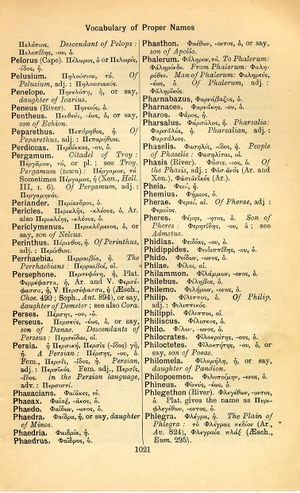Philemo: Difference between revisions
From LSJ
Θέλομεν καλῶς ζῆν πάντες, ἀλλ' οὐ δυνάμεθα → Bene vivere omnes volumus, at non possumus → Gut leben wollen wir alle, doch wir können es nicht
(6_12) |
(D_7) |
||
| Line 4: | Line 4: | ||
{{Lewis | {{Lewis | ||
|lshtext=<b>Phĭlēmo</b>: or -on, ŏnis, m., = Φιλήμων.<br /><b>I</b> A Greek [[comic]] [[poet]], a [[native]] of [[Soli]], in [[Cilicia]], and a [[contemporary]] of [[Menander]], Plaut. Trin. prol. 10; cf. Quint. 10, 1, 72; Gell. 17, 4, 1; App. Flor. 3, p. 353.—<br /><b>II</b> An [[historian]], Plin. 4, 13, 27, § 95.—<br /><b>III</b> In [[mythology]], a [[pious]] [[rustic]], the [[husband]] of [[Baucis]], Ov M. 8, 631 sq. | |lshtext=<b>Phĭlēmo</b>: or -on, ŏnis, m., = Φιλήμων.<br /><b>I</b> A Greek [[comic]] [[poet]], a [[native]] of [[Soli]], in [[Cilicia]], and a [[contemporary]] of [[Menander]], Plaut. Trin. prol. 10; cf. Quint. 10, 1, 72; Gell. 17, 4, 1; App. Flor. 3, p. 353.—<br /><b>II</b> An [[historian]], Plin. 4, 13, 27, § 95.—<br /><b>III</b> In [[mythology]], a [[pious]] [[rustic]], the [[husband]] of [[Baucis]], Ov M. 8, 631 sq. | ||
}} | |||
{{Gaffiot | |||
|gf=<b>Phĭlēmō</b> <b>(-mōn)</b>, ōnis, m. (Φιλήμων),<br /><b>1</b> Philémon [mari de [[Baucis]] : Ov. M. 8, 631<br /><b>2</b> poète grec de la nouvelle comédie : Pl. Trin. 10 ; Quint. 10, 1, 72<br /><b>3</b> nom d’un historien du temps d’Auguste : Plin. 4, 95. | |||
}} | }} | ||
Revision as of 06:42, 14 August 2017
English > Greek (Woodhouse)
Φιλήμων, -ονος, ὁ.
Latin > English (Lewis & Short)
Phĭlēmo: or -on, ŏnis, m., = Φιλήμων.
I A Greek comic poet, a native of Soli, in Cilicia, and a contemporary of Menander, Plaut. Trin. prol. 10; cf. Quint. 10, 1, 72; Gell. 17, 4, 1; App. Flor. 3, p. 353.—
II An historian, Plin. 4, 13, 27, § 95.—
III In mythology, a pious rustic, the husband of Baucis, Ov M. 8, 631 sq.
Latin > French (Gaffiot 2016)
Phĭlēmō (-mōn), ōnis, m. (Φιλήμων),
1 Philémon [mari de Baucis : Ov. M. 8, 631
2 poète grec de la nouvelle comédie : Pl. Trin. 10 ; Quint. 10, 1, 72
3 nom d’un historien du temps d’Auguste : Plin. 4, 95.

